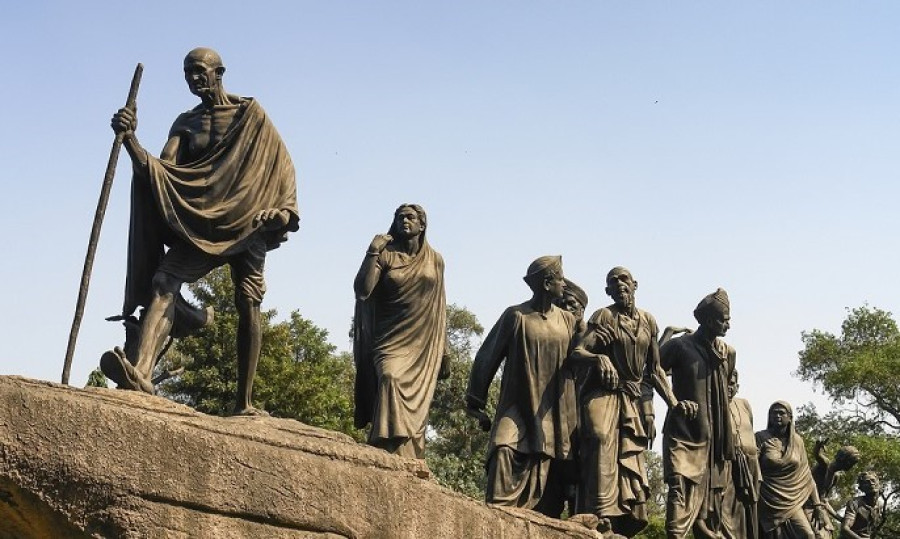Columns
The relevance of Gandhi
His thoughts are closer to what we today call sustainable and suitable alternative development.
Lok Raj Baral
Gandhism is based on two core principles: Non-violence and decentralisation of power and resources. Both principles imply the doctrine of renunciation of violent conflicts of all natures and magnitudes, and the emancipation of poverty-stricken people. Gandhi was greatly influenced by different streams of thought such as the Gita, the Upanishad, Buddhism and other religions, Marxian and anarchist thoughts, and by thinkers like Leo Tolstoy and Ruskin, just to name a few. He attacked caste and other forms of inequality that heighten conflicts, and the remedies he prescribed can be possible through a village-oriented economy and social reforms.
Such thoughts are closer to what we today call sustainable and suitable alternative development. Gandhi adopted untouchables as Harijan, children of God. To Gandhi, god meant truth that applied to all sections of society. Gandhi stood for women empowerment which is another way of reducing discrimination between men and women. In much of his writings including Hind Swaraj, Gandhi becomes an agent of social change without which the dream of Indian independence remained unfulfilled. However, during his last days, Gandhi had turned a pessimist as his own disciples didn’t give much weight to his vision of a new India.
Back to the village
Gandhi challenged the capitalist market-driven economic order with his rural-based planning and its sincere implementation believing that only small scale economic activities—kutir udyog—could solve the problem of local unemployment. Instead of going for the path of Western industrialisation, Gandhi preferred an agro-based economy and consumption of locally grown products.
Today, a return to the villages, as Gandhi had advocated, is being accepted as an alternative to the vanishing scope of external job markets. And governments that boast of a remittance economy as the contributing factor to economic growth are now under pressure due to reverse migrations. New economic and social crises are likely to disturb the existing development theories as well as the social and political order. Now South Asian countries have to find new alternative sources of employment for their people. And the Gandhian rural economic model is likely to be of great help if the leaders of these countries are really motivated for a new policy shift.
Eradication of poverty and hunger, education for all, equality of opportunities, equitable social system or distributive justice and guarantee of basic needs (health, education, food, shelter and security) were Gandhi’s areas of major concern. In addition, Gandhi’s view on environment-friendly development and job-oriented education are always relevant, more so in today’s conditions of environmental degradation caused by excessive human encroachment. The faulty developmental activities carried out by unscrupulous elements who work in tandem with politicians and bureaucrats and others have contributed to human suffering and climate change. These developments are against Gandhi who articulated a cordial relationship between man and nature.
A question is always asked about the relevance of Gandhism. The doctrine of satyagraha and non-violence is selectively used by politicians. But, at other normal times, the same parties adopt peaceful protests for scoring their demands. It is interesting to refer here to the arguments of BP Koirala (first elected prime minister of Nepal) who, by way of delivering a lecture on the relevance of Gandhi at the Gandhian Institute at Varanasi in October 1969, said that in a country like Nepal where all avenues of freedom of expressions had been blocked and a dictatorial regime prevailed, Gandhian methods could not be relevant to bring about a change in the country. BP argued that since the Britishers were more or less tolerant and democratic in their political culture, it was possible to use the weapon of satyagraha and non-violence. BP, as prime minister, had been influenced by Gandhi when he said to his planning commission members that he wanted to frame economic policies by looking at a photo of a peasant with a plough on his shoulder. Similarly, echoing Gandhi, BP, on the eve of his arrest by king Mahendra in 1960, had declared that 'air, water and land belong to those who consume it'.
Influenced by the Gita’s message of detachment (anashakti), Gandhi urged landlords and other rich people to share their properties with the have-nots or poor people of India. Following this idea, Vinoba Bhave and Jaya Prakash Narayan initiated the Bhoodan movement urging landlords to share their lands with the peasants. Gandhi called it trusteeship.
The ideas of all great men or women are not generally accepted during their lifetimes, but rediscovered a long time after their deaths. Now the turn of Gandhi has come as the agenda of globalisation is being revisited in order to find alternative developmental models. Since many countries are becoming more inward-looking or trying to localise their developmental efforts, the gust of globalisation seems to be abating. The 'Make in India' or 'America First' approach and protection of domestic markets by emphasising swadeshi products indicate a paradigm shift.
Interdependent world
Nevertheless, to extricate oneself entirely from global trends is neither possible nor desirable. Above all, countries cannot confine themselves since an interdependent world is still a reality. Many people argue that it is high time to localise the Sustainable Development Goals (SDGs) set by the United Nations. Since the SDGs have many ingredients of Gandhism, it is relevant to use them as part of rural development, women empowerment, promotion of equitable distribution of resources and services, prevention of climatic and environmental degradation and emphasis on rural development.
Gandhi was a great agent of social change without declaring himself a radical revolutionary. Communism in practice has failed, but freedom, the dignity of human beings and an end to exploitation are being championed across the world. And the Gandhian way of a simple and less ostentatious lifestyle is likely to be attractive because the glamour of life should also be equal and equitable.
***
What do you think?
Dear reader, we’d like to hear from you. We regularly publish letters to the editor on contemporary issues or direct responses to something the Post has recently published. Please send your letters to [email protected] with "Letter to the Editor" in the subject line. Please include your name, location, and a contact address so one of our editors can reach out to you.




 9.7°C Kathmandu
9.7°C Kathmandu















